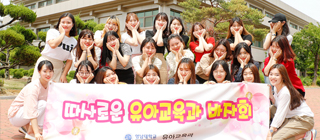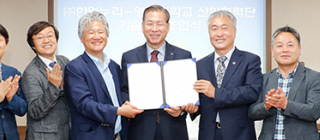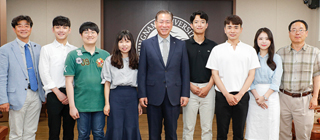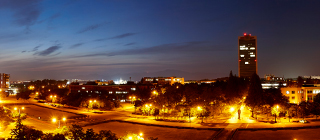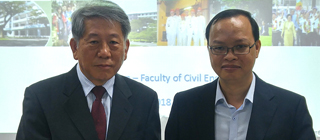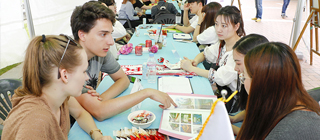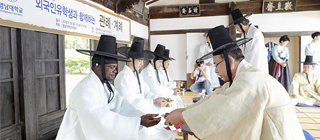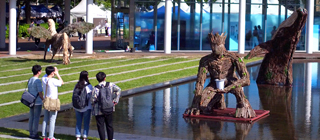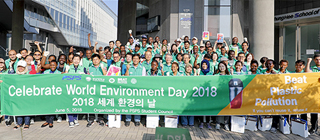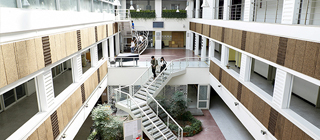-
Students of the YU Department of Early Childhood Education hold bazaar during college festival and donate earnings Donated 3.58 million won to ChildFund Korea for four years since 2015 Sharing becomes a department tradition... Plans to engage in talent donation activities such as education volunteering [June 8, 2018] <YU Department of Childhood Education students who donated festival earnings for the fourth year> College students who held bazaars during college festivals every year have become a beautiful story. They are students of the YU Department of Early Childhood Education. They donated 710,000 won that they earned from a bazaar held during the May school festival and donated the money to ChildFund Korea, a children’s welfare institute, on June 4. This is the fourth year since beginning donation activities in 2015. They have donated a total of 3.58 million won to organizations involved with young children. Students who participated in the donation activities said, “Though it is not much money, it is rewarding that through our campaign people might have gained more interest on needy children around us.” The YU Department of Early Childhood Education enjoyed festivals a bit differently from the normal college festival since 2015. they have been participating in various campaigns and charity drives for ‘young children rights advocacy’ that is related to their major. At this festival, they sold clothes and bags donated by undergraduate and graduate students and also sold bracelets that they hand-made to continue the donation activities. The students said that they plan to use what they learned in their majors to engage in other talent sharing activities utilizing their knowledge and talents. YU Department of Early Childhood Education student president Kim Hye-joo (21, junior) said, “We are planning to make a school club to engage in education volunteer activities for needy children and also plan to donate educational tools that students made to preschools, etc. We hope that such sharing will become a tradition of our department.” YU Department of Early Childhood Education Dean Yoon Jae-hee said, “I am proud to see the students plan out campaigns and practice sharing,” and added, “When considering the social atmosphere that emphasizes sensibility for human rights as capacities for teachers of young children, the experience of sharing time and passion for young children will have a positive impact on the future young children teachers.”
-
Technology developed by School of Chemical Engineering Jung Jae-hak to be transferred to Hanyeolnuri Technology transfer fee 150 million won... Solving solar power quality issue and constructing optimal management system Never before applied in the world... Expected to enhance market value [June 15, 2018] YU (President Sur Gil-soo) will transfer solar power technologies, which is a core next-generation industry, to a company. At 2 p.m. on the 14th, YU signed a technology transfer MOU with Hanyeolnuri (CEO Kwon Taek-jo), which is a company specializing in renewable energy located in Chungbuk. The technologies that will be transferred include three patented technologies related to solar energy possessed by YU including the ‘independent solar power generation control device and control method’ developed by YU School of Chemical Engineering Professor Jung Jae-hak. With this contract, YU will receive a technology transfer fee of 150 million won. The technology that YU transferred allows smooth power use and management using a battery instead of the solar power generation system that depends on sunlight. Furthermore, as it can predict the time of power usage and module replacement time through the module reliability evaluation system that applied semiconductor simulation technologies, it is possible to construct the optimal management system for solar power modules. The independent solar power generation system that applies this technology can solve the inconsistent power quality issue depending on the always changing sunlight and it can also cut down on maintenance costs as the battery life was extended by 10-20%. This technology was never before applied in the world so it is expected to have very high market value. In order to apply this technology in domestic and foreign solar power generators, YU and Hanyeolnuri is planning to construct a performance evaluation system and optimal control system by next year and is scheduled to apply it as the standard system for domestic and foreign solar power generators beginning construction in 2020. YU President Sur Gil-soo said, “The outstanding technologies and researchers of YU are now being recognized by companies.” He added, “YU will take the initiative in creating future growth-engines through industry-academic cooperation in various fields.”
-
Highest number of passers among universities in Daegu and Gyeongbuk... 4 in administration, 2 in technical 4 in 2016, 5 in 2017... Number of passes increase every year thanks to systematic support from the university [June 19, 2018] <YU graduates who passed the ‘2018 National Position Regional Talent Grade 7 Trainee Test’> (from left to right: Employment Office Director Lee Seung-woo, Park Geon-ho, CHoi Joon-young, Lee Hae-jung, YU President Sur Gil-soo, Lee Yang-hee, Lee Min-gyu, Park Jung-min, Department of Police Administration Professor Sung Do-gyeong)> YU (President Sur Gil-soo) celebrated having six people pass the ‘2018 National Position Regional Talent Grade 7 Trainee Test’. This is the highest number of passers among universities in the Daegu and Gyeongbuk regions. In this year’s test, a total of 498 students from 111 universities around the nation and 130 were selected. Six of them comprised of four in administrative and two in technical positions were from YU. In administrative positions they are Lee Yang-hee (26, graduated from the School of Economics and Finance), Lee Min-gyu (25, graduated from Department of Food Science and Technology), Lee Hae-jung (24, graduated from Department of Media and Communication), Park Jung-min (22, graduated from Department of Public Administration), and from technical positions, they were Park Geon-ho (26, graduated from the School of Mechanical Engineering), and Choi Joon-young (25, graduated from the Department of Mechanical Engineering). The number of passers from YU has been continuously on the rise from four in 2016 to five in 2017. It is judged that the systematic and assertive support by the university is resulting in such heightened competitiveness. YU helps students throughout the entire process from recruiting college recommendee to written tests and applications. Lee Min-gyu, who graduated in August of last year, said, “The regular lectures and employment study groups offered by the university help a lot. In particular, thanks to the consideration from the school and advising professor, I was able to take the official position aptitude class in the second semester of last year despite already graduating, which helped me a lot in passing the written test.” He added, “After completing the training, I would like to utilize my major next year and work at the Ministry of Trade, Industry and Energy or the Ministry of Agriculture, Food and Rural Affairs.” Around June of every year, YU offers regular lectures on written tests, etc. by recruiting students preparing for the ‘National Position Regional Talent Grade 7 Trainee Test’ and assigns an advising professor (School of Police Administration Professor Sung Do-gyeong) for individual guidance. Also, the Employment Office offers online lectures and supports employment study groups to prepare for written tests and also helps students prepare for interviews through meetings with seniors who passed the test in the past. YU Employment Office Director Lee Seung-woo said, “The secret to the high passing rate is the university’s systematic support that provides practical assistance to students preparing to enter the public sector from public position aptitude tests to final interviews.” He added, “We have displayed significantly higher passing rates not only in national position regional talents, but also for general public employee tests compared to other universities. Students who are interested in working in the public sector will receive a lot of assistance by participating in programs offered by the university.” Meanwhile, those who passed will be admitted to the National Public Employee Talent Development Center in the first half of next year and participate in a four-week program for adapting to public positions and basic training to improve work competence. Afterwards, they will work as trainees at central administrative institutes (ministries, offices, etc.). Their training period is approximately one year and after completing the work training, they will be appointed as regular public employees after receiving work execution evaluations.
-
2018 Leiden Rankings, proving world-class research capacities Overall ranking 10th in Korea, 7th in life and earth science, 15th in social science and humanities Qualitative factors such as university reputation excluded, rankings based on achievements and quality of research [May 23, 2018] The research capacities of YU (President Sur Gil-soo) were once again to be at world-class levels. YU was ranked 50th in the world and first in Korea in the mathematics & computer science sectors in the ‘2018 Leiden Ranking’ that assesses global university rankings based on qualitative levels of theses. YU was ranked in the top 50 of the world for four straight years in the mathematics & computer science sectors. When excluding YU, there is not a single Korean university ranked in the top 300, thus highlighting the research capacities of YU. The Leiden Ranking publishes rankings in five sectors such as overall ranking, mathematics & computer science, biomedical & health sciences, life & earth sciences, physical sciences & engineering, and social sciences and humanities. In the overall ranking, YU climbed up the ladder from 15th in Korea last year to 10th this year. This is due to the fact that the ratio of the top 10% thesis ratio rose from 7.1% last year to 8.1% this year. It also climbed the ranks in the life & earth sciences to seventh place in Korea, 15th in social sciences and humanities, and 19th in physical sciences / engineering, thus being recognized for the superiority of its research capacities in all fields. (based on proportion of theses in top 10% of citation frequency) The Leiden Ranking is computed based on the number of theses and the ratio of citations of theses, while excluding subjective qualitative assessment elements such as college reputation, etc. by Leiden University of the Netherlands. The Leiden Ranking computes rankings by comparing the theses in the top 10% cited theses in each academic field with the total number of theses. Therefore, it is an important index that makes it possible to judge the research achievements and quality of research of universities. It announces rankings annually since 2011 by analyzing theses of the past four years by using the database of Thomson Reuters, which is an academic information service company. This year, it evaluated a total of 938 universities around the world that published at least 1,000 international theses from 2013 to 2016. A total of 35 Korean universities including YU were named in the rankings. The Leiden Ranking mainly uses the top 10% cited theses in each academic field by the ratio comparing with all theses. The ratio of the top 10% cited theses are the main indices of the rankings, but it also announces the top 1% thesis ratio, etc. through the free database.
-
Pursuing international exchange student + internship ‘hybrid program’ MOU between ‘Department of Civil Engineering and Vietnam National University – Ho Chi Minh City University of Technology’ Currently negotiating with five Korean conglomerates in Vietnam – synergy effect for global and employment capacities [June 1, 2018] <YU Department of Civil Engineering and Vietnam National University Ho Chi Minh City University of Technology Department of Civil Engineering signed an MOU to pursue a ‘hybrid program’> YU (President Sur Gil-soo) will pursue the ‘hybrid program’, a new kind of international exchange program for students to enter other nations. The ‘Hybrid Program’ combines the advantages of existing overseas exchange student programs with that of overseas internships. Students participating in the program will first study at a local university in the first semester as an exchange student and then work in an internship at a local company in the following semester. Students will be able to become familiarized with the language, culture and lifestyle first as an exchange student and then gain on-site work experience at companies. Therefore, this is expected to create a synergy effect in terms of the global competitiveness and employment capacities for students. The first partner of the ‘hybrid program’ pursued by YU will be Vietnam. Vietnam is currently the fourth biggest trading partner of Korea and there has been a continuous increase of Korean companies entering Vietnam. Accordingly, it is expected that there will be a growing demand for local experts in regards to Vietnam and local conditions so there is growing interest on the success of this program. YU noticed the increasing demand for the construction sector in Vietnam and thus began to discuss the hybrid program with HCMUT (Ho Chi Minh City University of Technology, Vietnam National University) since last year. The two universities agreed to pursue the hybrid program first in the construction and civil engineering fields. Finally on May 28, the YU Department of Civil Engineering (Dean Lee Jong-dal) signed an MOU for the operation of the program with HCMUT. With this agreement, students of the YU Department of Civil Engineering will participate in the hybrid program from the first semester of the 2019 school year. The two universities that made this MOU will look for local companies that will participate in the hybrid program. YU External Cooperation Office Director Heo Chang-deok said, “YU signed an MOU with a prestigious national university of Vietnam and is currently holding discussions with five conglomerates that entered Ho Chi Minh City, so it is expected that this newly attempted hybrid program will sail smoothly.” He added, “We will not only strengthen the global competitiveness of students, but also plan out various globalization programs that can provide practical assistance for students to begin their professional careers such as finding jobs abroad.” The reason why a prestigious national university of Vietnam became the first partner for the YU hybrid program was due to its ties with Le Anh Tuan, dean of the HCMUT dean. Mr. Le Anh Tuan earned his PhD at the YU Graduate School of Civil Engineering in 2005 and then received his tenure as a professor at HCMUT. Last year, the YU international exchange team proposed the hybrid program and Dean Le Anh Tuan, who was always interested in exchange with his alma mater YU, assertively took the lead for exchange. HCMUT is a national university of Vietnam with 22,000 enrolled students and was founded in 1957. It is a prestigious university recognized for its educational achievements and boasts an employment rate of over 90%. In particular, among the 11 departments offered by the university, the Department of Civil Engineering is the largest with approximately 4,500 undergraduates and 250 graduate students.
-
Third YU International EXPO held on 16th and 17th 47 international students from 22 universities in 13 different countries participate to offer information on local life and culture Introduction of globalization programs, offer consulting on overseas internships and employment [May 16, 2018] YU (President Sur Gil-soo) held the ‘3rd YU International EXP’. YU has been holding the EXPO annually since 2016 to strengthen the global capacities of students. It is receiving huge interest from students as it offers information on various international programs such as overseas exchange student programs. This EXPO, which was held in front of the clock tower at the main gate of YU on the 16th and 17th, was joined by 47 international exchange students from 22 sister universities from 13 nations including France, Poland, USA, Brazil and China. At the booths provided for each university, foreign students studying at YU as exchange students and former exchange students who went abroad to study at foreign universities took part to introduce their respective nations and local universities, while also offering their first-hand experiences and practical information on living abroad, their cultures, etc. Lee Tae-joon (23, YU School of Economics and Finance, junior) said, “I am considering applying to become an exchange student in the second semester of this year. However, it was more difficult than expected to obtain information so I came to this EXPO. I am very interested in universities in the Eastern European region. I came to the EXPO and found that there are many universities from different countries, so I am gaining a lot of information here.” He added, “It was great that I could not only learn about the educational programs of local universities, but also in-company club activities, as well as public safety and everyday life.” Through this EXPO, YU offered information on various international programs such as the exchange student program, backpacking program on different themes (Window to the World), language and cultural exchange program between foreign exchange students and local students (LPP, Buddy Program), etc. Also, overseas internship agencies and college job centers also participated to provide overseas internship and employment information as well. Meanwhile, YU currently has sisterhood relations with 389 universities and institutes in 50 countries around the world and is operating international exchange programs. As of the first semester of 2018, a total of 167 YU students are studying abroad in 57 colleges in 15 countries, while 148 foreign students from 41 sister universities in 15 countries are studying at YU.
-
YU holds gwanrye and gyerye event with international students for the 'Coming-of-Age Ceremony' Experiencing traditional coming-of-age ceremonies and the charms of traditional Korean culture [May 18, 2018] <Traditional coming-of-age ceremony with international students - gwanrye> At Gugye-seowon inside of the YU Gyeongsan Campus Folk Village at 10 a.m. on the 18th, international students wearing Korea’s traditional garment called the hanbok and gat (traditional hat for men) and binyeo (ornamental hair pieces for women) became the focus of attention. YU (President Sur Gil-soo) held the 'traditional coming-of-age ceremony' event for international students for the 46th coming-of-age day (third Monday of May). A total of eight students including six international students from Uzbekistan, Kenya, Columbia and China wore traditional Korean clothes to take part in the ceremonies called ‘gwanrye’ and ‘gyerye’. Musrmonkulov Umidjon (24, junior) from Uzbekistan who enrolled at the YU School of Mechanical Engineering in 2016 said, “When a woman gets married in Uzbekistan, we have a ritual similar to the Korean coming-of-age ceremony,” while adding, “I am really interested in Korean traditional culture. I also experienced the traditional wedding ceremony at the Daegaya Museum so the hanbok is not completely new to me. I think this will be a fun memory for my time studying in Korea.” Gwanrye is a ceremony of placing three gwan, or head pieces, on men who became 20 years old and emphasizes their responsibilities to their family, relatives and country. It is completed by tying the hair up in a knot and wearing three hats, and the bunri-ceremony of changing clothes, and is completed with a drink of alcohol and announcing to the heavens that one has become an adult. It also includes the myeonjarye ritual of giving an 'alias' to be used instead of one's name as a symbol of protecting one's body and name that was given to them by their ancestors. Gyerye is a ceremony of untying a girl's hair and placing a binyeo, which is an ornamental hair piece, in the hair to announce that a girl has become a woman. <Traditional coming-of-age ceremony with international students - gyerye> At the coming-of-age ceremony, YU President Sur Gil-soo was invited as the big elder for the first ceremony of 'gwanhonsangje' and recited a speech to congratulate male students who became 20 years old, and placed the three hats of chipogeon, yugeon and finally the gat, and tied the strings to officially announce their adulthood. President Sur Gil-soo, who watched the traditional coming-of-age ceremony from start to finish, said, "I hope that you will think about the meaning of becoming an adult by participating in the traditional gwanrye and gyerye events," while adding, "I hope that especially for international students, it will be a great memory and an opportunity to gain deeper insight into Korean culture." 'Coming-of-Age Day' falls on the third Monday of May and is a day to naturally remind young adults who became 20 years old of their responsibilities and duties, while congratulating their physical and mental maturation as a young adult.
-
-
-
School of Architecture saves 10 million won annually in power costs through the energy conservation campaign Looking to install ‘solar power generator’ with national funding... Taking the initiative for constructing a green campus “Need participation of everyone to create an energy-saving, eco-friendly campus” [May 29, 2018] <YU Mechanical Facility Situation Room> The YU School of Architecture (Dean Kwon Jong-wook) is reaping fruit from its energy conservation activities. The YU School of Architecture engaged in various energy conversation campaigns for students and faculty, which resulted in saving 24% of energy compared to the previous year (2016). When converting to annual electrical costs, this is a saving of more than 10 million won. The School of Architecture held regular meetings for professors, administrative office and student government and reached an agreement that it is necessary to conserve energy in the school. Through this, they began participating in energy-conservation activities in everyday life such as avoiding use of the design lab in late hours, turning off lights in classrooms when empty, avoiding unnecessary use of computers in the design lab, recommending limited use of heating and cooling facilities, attaching energy-saving stickers, disconnecting power cords for hot water in restrooms during the summer, etc. In result, energy consumption at the Architecture Hall (including the College of Engineering) dropped significantly from 204tCO2e (units converting electric power usage into carbon emissions) in 2016 to 156tCO2e in 2017. <See carbon dioxide emissions table below> <School of Architecture (Architecture Hall) energy consumption> ※ The above data is the conversion of electric usage into carbon emissions and it is information for constructing an eco-friendly campus by conserving energy and resources. The School of Architecture took another step to take the initiative for constructing a green campus. The School of Architecture was selected for the 2018 Renewable Energy Distribution (Building Support) project hosted by the Korea Energy Corporation. Through this project, the School of Architecture will install an annual 25MWh solar power generator using funds of 43 million won including 18 million won from national funding and from the development fund for the School of Architecture. It is estimated that this will save an annual 2.6 million won. YU Facilities Management Office Director Kim Moon-jae said, “We hope that in addition to our energy element tracking management, database construction and other activities, all of the members of the university will voluntarily participate in various energy conservation activities.”
